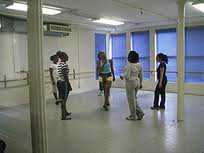When Girls Come First

At a time when both arts and physical education classes are threatened with extinction due to school budget cutbacks, non-profit programs are all the more important, especially for underserved girls.
Abigail Rosin is the executive director of a youth development organization where professional dancers teach free classes to students in New York’s East Harlem neighborhood. Maya Nussbaum is a co-founder and executive director of a non-profit organization that teams budding writers from public schools in low-income neighborhoods of New York with professional writers. Their focus is similar: both administer volunteer-run mentoring programs for girls only.
Rosin and Nussbaum take their cue from a 2000 report, Community Counts: How Youth Organizations Matter for Youth Development by the Public Education Network—a national association working to advance public school reform in low-income communities across the United States. The report finds “an absolute level of underservice to girls overall in communities, and too many instances of girls being treated as second-class citizens in coeducational programs.”
Addressing this programming gap, Abigail Rosin has set up Groove With Me, “a place where girls can experiment with their bodies without trying to look cute for the boys.” It provides a far different atmosphere than those in the study where girls were often “afterthoughts” in programs designed for “at-risk” boys. Housed on a narrow street lined with colorful graffiti art and protected by a security guard, this dance studio is the after-school home of young girls in the neighborhood. There they develop the confidence to express themselves creatively, undisturbed.
“Boys can be distracting—not just when you are discovering the opposite sex but also when you are younger,” says Rebecca Distler, a Yale student who is spending her summer on a journalism internship and volunteering at Groove With Me. By the time they reach high school, girls in East Harlem experience pregnancy rates that are among the highest in the nation, 142 per 1,000 girls aged 15 to 19.
According to a new report from the National Women’s Law Center, When Girls Don’t Graduate, We All Fail: A Call to Improve High School Graduation Rates for Girls, pregnancy is cited as a significant factor, leading to a dropout crisis for girls in our nation’s schools. One of every four girls fails to complete her high school diploma in four years, and the numbers are worse for girls of color.
Rosin believes that Groove With Me plays a role in the prevention of teen pregnancy. “We provide a safe environment where the girls can be occupied during idle afterschool and weekend hours.” Her organization “creates a community of girls and women so that young women know that they are not alone, others feel the way they do, and there are people they can go to.”
Similarly, Maya Nussbaum works with “underserved or at-risk high school girls, enabling them to develop their creative, independent voices,” explains the co-founder and executive director of Girls Write Now. Equipped with a degree in creative writing, Nussbaum founded the organization in 1988. “When I began, I didn’t have volunteers to mentor girls,” she says. “So, I worked with fellow creative writing graduate students at Columbia [University in New York].” A decade later, hers is the only nonprofit on the East Coast that offers such a mentorship program for teenage girls.
In Los Angeles, a former Girls Write Now mentor, Karen Taylor, has founded a similar organization, called WriteGirl. When she moved to LA in 2000, says Taylor via email, she saw “overcrowded schools, low graduation rates, low literacy rates, few community programs for youth.” Her group also offers an in-schools program where they take mentors into the classroom.
Those involved with these after school programs have varying views on the sometimes-controversial question of separate education for girls. Groove With Me intern Rebecca Distler says, “I am not a big proponent of girls-only education per se, but I definitely believe in having girls-only programs that supplement a co-ed education.” Nussbaum agrees that “girls-only out of school programming is critical for many girls. Girls Write Now is a testament to that.” Karen Taylor’s perspective is that “girls thrive in our gender-specific environment—we are completely certain of that.” She says her group is not specifically promoting same-sex education, but “we know of many fabulous all-girls schools.”
All are committed to providing girls with programming tailored to their needs—an alternative to an example described in the Community Counts report, where “an afterschool activity for girls involves standing around watching the boys play pool rather than one constructed specifically for and by the young women.”
More articles by Category: Economy, Education, Sports
More articles by Tag:



























